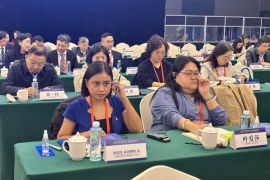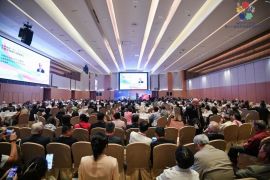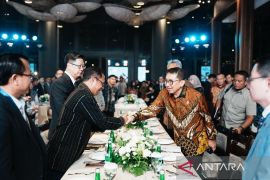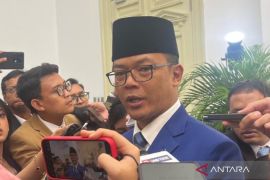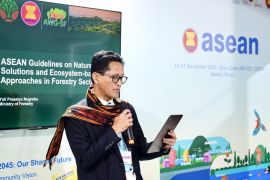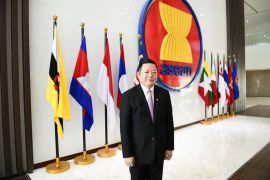Now is the right moment for Indonesia to put human rights on top of ASEAN`s agenda and maximize its role in advancing human rights through the existing mechanism , the ASEAN Intergovernmental Commission on Human Rights (AICHR), said Choirul Anam, deputy director of the Human Rights Working Group.
The ASEAN chairmanship was given to Indonesia after the 10 member states of ASEAN in April 2009 unanimously agreed to Indonesia`s request for a swap of the ASEAN chairmanship with Brunei Darussalam for the year 2011.
The themse of Indonesia`s ASEAN chairmanship, "ASEAN Community in a Global Community of Nations", had also elicited praise from ASEAN Secretary-General Dr Surin Pitsuwan as it reflects Indonesia`s preparedness to be engaged, proactive in using the ASEAN platform to enhance ASEAN`s profile in the global arena.
As part of its efforts toward forming an ASEAN community, ASEAN had set up a human rights commission.
The commission, whose official name is the ASEAN Intergovernmental Commission on Human Rights (AICHR), was officially established at the 15th ASEAN Summit in Phuket, Thailand, in October 2009.
AICHR`s purpose
Pursuant to Article 14 of the ASEAN Charter, there are six purposes of the ASEAN Intergovernmental Commission on Human Rights.
First, AICHR aims to promote and protect human rights and fundamental freedoms of the peoples of ASEAN.
Second, it aims to uphold the right of the peoples of ASEAN to live in peace, dignity and prosperity.
It also serves as a body to contribute to the realization of the purposes of ASEAN as set out in the ASEAN Charter in order to promote stability and harmony in the region, friendship and cooperation among ASEAN Member States, as well as the well-being, livelihood, welfare and participation of ASEAN peoples in the ASEAN Community building process.
The next is to promote human rights within the regional context, bearing in mind national and regional particularities and mutual respect for different historical, cultural and religious backgrounds, and taking into account the balance between rights and responsibilities.
Fifth, it was established to enhance regional cooperation with a view to complementing national and international efforts on the promotion and protection of human rights.
The last purpose of AICHR is to uphold international human rights standards as prescribed by the Universal Declaration of Human Rights, the Vienna Declaration and Programme of Action, and international human rights instruments to which ASEAN Member States are parties.
RI President`s pledge
Meanwhile, RI President Susilo Bambang Yudhoyono had expressed optimism that the AICHR would eventually be able to protect human rights in the region effectively.
Speaking to the press at the end of his visit to attend the 15th ASEAN Summit in Hua Hin, Thailand, in October 2009, Yudhoyono said Indonesia was committed to making continuous efforts to enable AICHR to improve human rights protection in the region.
"I remain optimistic that the ASEAN Intergovernmental Commission on Human Rights will one day be an effective instrument to protect human rights, and therefore all ASEAN countries should seriously promote it because it is part of the ASEAN Charter`s mandate," President Yudhoyono said.
ASEAN`s ten member countries had different political systems, histories, and democratic processes so they needed time to reach a harmonious consensus on the issue of human rights protection, he said.
"Indonesia will continue to support human rights protection in ASEAN," President Yudhoyono said, adding that domestic human rights protection now was effective enough.
He said the government was very serious in giving human rights protection to the people, and wanted a better cooperation from various public sectors to improve it.
At a recent briefing by the Secretary-General of ASEAN, Dr Surin Pitsuwan, at Indonesia`s Presidential Palace, Yudhoyono said that, as ASEAN was a people-centered Association, he would like the public to be more involved in ASEAN events, adding that Indonesia was prepared to work together with the youth, students, business communities and civil society organizations in all stages, from preparation to implementation.
Chances for Indonesia
Indonesia as a democratic country was highly expected to use its term as ASEAN chair to promote respect for human rights within the national and international communities, Anam said.
According to Choirul Anam, there were several ways for Indonesia to put human rights on top of its priorities as the ASEAN chair and to maximize its role in advancing human rights in ASEAN.
"The first way is by providing support for the institutional building of the ASEAN Inter-governmental Commission on Human Rights (AICHR)," Anam said.
It had been more than one year since the establishment of the AICHR but until today this human rights body could not operate effectively due to lack of resources, including the non-existence of a regional secretariat and staff to support its work, he said.
A similar problem was handicapping the ASEAN commission on the Promotion and Protection of the Rights of Women and Children (ACWC), he added.
"We hope that during its chairmanship, Indonesia can ensure that these human rights bodies will be equipped with sufficient resources to support their missions," Anam said.
As stated in the ASEAN Charter, ASEAN is a `people oriented` organization. Therefore, it is also important for Indonesia to show its willingness to broaden people`s participation in ASEAN policy making especially those which would have a direct impact on people`s welfare such as the Instruments on Migrant Workers, the ASEAN Disability Forum, and the work of the ASEAN Community Councils.
"By providing institutional framework for the engagement of civil society, the Indonesian government can ensure that there will be ample room for civil society to follow and be engage in ASEAN meetings," Anam said.
Indonesia is also known for having a good image at the international level on human rights and democracy. "We hope that Indonesia can also show its leadership in ASEAN in promoting and responding to human rights in this region," Anam said.
In the AICHR`s work plan for 2011 and the Term of Reference of the AICHR, AICHR has a mandate to draft the ASEAN Human Rights Declaration. Indonesia has a great diplomatic role to ensure that this declaration will finish timely and become a sound instrument that in line with the universal human rights.
Indonesian government also has diplomatic role to persuade and push the ASEAN member states in responding to human rights situation in the region, such as what happens in Burma.
"As hoped by Aung San Suu Kyi in an interview in December 2010, she hoped that ASEAN and Indonesian government as the chair urge the government of Burma to present an inclusive political process for improving the situation in Burma," Anam said.
Meanwhile, Haris Azhar, coordinator of the Commission on Missing Persons and Victims of Violence (Kontras), said there were many opportunities for Indonesia during its ASEAN chairmanship to increase ASEAN`s capacity with regard to law enforcement and human rights issues.
Indonesia within its 2011 ASEAN chairmanship could strengthen its national capacity towards relationship with ASEAN countries, he said, adding that Indonesia also had an important role to play in reinforcing Timor Leste to become an ASEAN member as the two countries had a `special relationship`.
Openness and candor of Indonesia as a democratic country should also be able to accommodate the voice of civilians and human rights violation victims to participate in ASEAN, he said.
"Indonesia should become the home ground for their voices in ASEAN," he said.
In addition to human rights violation, Indonesia should also put great emphasize for the faith of migrant workers by ratifying convention for migrant workers protection.(*)
Reporter: Aditya E.s. Wicaksono
Editor: Aditia Maruli Radja
Copyright © ANTARA 2011
